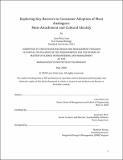| dc.contributor.author | Ortiz-Luis, Lara
(Larisse-Ann Yee) | en_US |
| dc.contributor.other | Massachusetts Institute of Technology. Integrated Design and Management Program. | en_US |
| dc.contributor.other | Sloan School of Management. | en_US |
| dc.date.accessioned | 2021-10-08T17:11:05Z | |
| dc.date.available | 2021-10-08T17:11:05Z | |
| dc.date.copyright | 2020 | en_US |
| dc.date.issued | 2020 | en_US |
| dc.identifier.uri | https://hdl.handle.net/1721.1/132904 | |
| dc.description | Thesis: M.B.A., Massachusetts Institute of Technology, Sloan School of Management, May, 2020 | en_US |
| dc.description | Cataloged from the official PDF of thesis. | en_US |
| dc.description | Includes bibliographical references (pages 56-62). | en_US |
| dc.description.abstract | The industrial meat production system has large scale environmental impacts from depleting natural resources such as water and land and emitting dangerous greenhouse gases, while negatively affecting human health. The inefficiencies of converting plant matter into animal meat is particularly pronounced for beef. Despite these effects, demand is on the rise across the world. Over the past five years, new companies have produced sophisticated meat analogues in the form of plant-based and cultured proteins with a value proposition of keeping meat's taste and cost while decreasing environmental impact. Barriers in pricing, technology, and distribution are currently top of mind for businesses competing in this new industry. Through a literature review, this paper investigates another crucial barrier to consumer adoption in psychological meat attachment and cultural food identity. I then propose an experimental study to test the hypothesis that a matched identity frame (i.e. masculine framing) could induce higher willingness to substitute a plant-based meat option for a conventional meat option of a given dish. | en_US |
| dc.description.statementofresponsibility | by Lara Ortiz-Luis. | en_US |
| dc.format.extent | 62 pages | en_US |
| dc.language.iso | eng | en_US |
| dc.publisher | Massachusetts Institute of Technology | en_US |
| dc.rights | MIT theses may be protected by copyright. Please reuse MIT thesis content according to the MIT Libraries Permissions Policy, which is available through the URL provided. | en_US |
| dc.rights.uri | http://dspace.mit.edu/handle/1721.1/7582 | en_US |
| dc.subject | Integrated Design and Management Program. | en_US |
| dc.subject | Sloan School of Management. | en_US |
| dc.title | Exploring key barriers to consumer adoption of meat analogues : meat attachment and cultural identity | en_US |
| dc.type | Thesis | en_US |
| dc.description.degree | M.B.A. | en_US |
| dc.contributor.department | Massachusetts Institute of Technology. Integrated Design and Management Program | en_US |
| dc.contributor.department | Sloan School of Management | en_US |
| dc.identifier.oclc | 1263359377 | en_US |
| dc.description.collection | M.B.A. Massachusetts Institute of Technology, Sloan School of Management | en_US |
| dspace.imported | 2021-10-08T17:11:05Z | en_US |
| mit.thesis.degree | Master | en_US |
| mit.thesis.department | Sloan | en_US |
